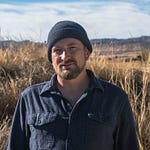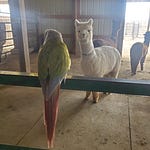The word ‘excitement’ has its origins in the mid-14th century Latin excitare, the root of which is ciere (PIE *keie-), meaning “to set in motion.” One gets the sense of something whirring internally, drawn into the greater company that only ex– “outness” can afford.
On my way to talk to Robin—Perelandra’s reader in residence last November—a most unruly thought hurtled to the fore of my excited animal brain. So when we sat down in the late winter, late morning light of Wolverine Farm, I asked, with special reference to her background in poetry:
Where does it all come from?
I blame excitement for the unthinkable galactic tentacles of this question, and why not? Is there a better approximation of the source of inquiry than the broad sense of being set in motion? Still, it was ridiculous—a question made outrageous by its too-obvious longing.
A silence settled between us like hoarfrost, and in the hoarfrost a gentle scattered light. The moment grew like a bramble; the weekend air crackled awake. Then Robin answered:
I love that question.
Robin is a veritable reservoir of readings in contemporary poetry (see ‘books mentioned’ below). And the breadth of her readings is, by some miracle, equaled by the quick of her apperception. (I’m not sure if using “quick” in this way is sanctioned by the grammar gods, but I trust you; take that, deities!) She is the reader that every poet dreams of: critically awake yet dauntlessly compassionate.
She is one of the kindest people I know, of a ready kinship that welcomes word and wild silence alike.
At one point in our conversation, I brought up James Joyce and Robin “confessed” to having never read him. So, with humor in honor of Robin’s modesty, the following is a summary of our conversation in the manner Joyce’s Ithaca episode of Ulysses. May it guide your foot on the trail!
*
What luminous subjects were sayable in the Saturday morning air?
Influence, verse (turning), linearity; con-verse-ing, the necessary prefixitive withness; reciprocity integral to influence; to keep that company with the thinker, the writer, the artist is such a balm to loneliness; we should always introduce ourselves with a luminous moment; what kind of process [do] you have to go through mentally, spiritually to open yourself enough to be opened by in order to be spoken through; J: maybe it is as simple as the circle. R: of course it’s as simple as the circle!; an hospitable book; step into the concentrated self, by the whole of earth’s processes; hospitality as some sort of force or pressure that distills; how to find home in wild spaces; not always comfortable, not always built, home is to be encountered; baptismal immersion, waters of language, startled into a way of thinking; poetry comes from calling out to ourselves, to each other; call returned by compaction; throwing the voice to be found, to not be found; poetry comes from guile; poetry comes from the animal; wallowing, wading as it relates to reading; lostness in text to perceive; to drown, disintegrate; shape of the word in the mouth; force of grief or absence; the word is always with us, always leaving us; when is it the poet’s task to abstain? TWO RAVENS CALLING.
Books mentioned:
Poetics and Praxis ‘After’ Objectivism ed. by W. Scott Howard, Broc Rossell
First and Last Notebooks by Simone Weil
Poetic Faith by David Mutschlecner
Finnegans Wake by James Joyce
The Poetics of Space by Gaston Bachelard
What Did I Do Wrong? by Fanny Howe
Jaguar Harmonics by Anne Waldman
Extinction Aria by Anne Waldman
Manatee/Humanity by Anne Waldman
Where Outside the Body is the Soul Today by Melissa Kwasny
Refugia by Kyce Bello
Orion Magazine
From the Arapahoe Songbook by Andrew Schelling
Zong! by M. Nourbese Philip
A Tomb for Anatole by Stéphane Mallarmé
The Voice of Sheila Chandra by Kazim Ali
Sir by HR Hegnauer












Share this post